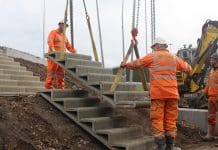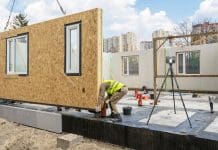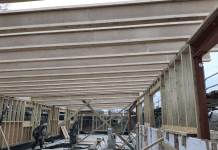David Hartley, managing director at MTX, shares his view on the many reasons why the demand for modern methods of construction has increased in the last two years
In what has been an unprecedented time for all, the healthcare sector has been the most dramatically affected by the COVID-19 pandemic. With increased patient demand came extended waiting lists and resource shortages, which meant existing infrastructure simply couldn’t cover the surge. This saw the introduction of measures such as the regional Nightingale Hospitals – quick and large-scale, but often only temporary structures.
Despite having been an already fairly popular choice for healthcare construction, twinned with the Government’s drive to build back better, greener, faster, the COVID-19 pandemic has accelerated demand for Modern Methods of Construction (MMC) and shone further light around the benefits of modular when compared to more traditional alternatives.
The availability of high-quality modular buildings has provided an effective solution for a healthcare sector faced with increased pressure on funding whilst urgently needing for additional facilities.
Since the creation of the NHS SBS Framework in 2017 – a recommended supplier list for the public sector – more than £341m of work has passed through the framework. Over £307m of that was accounted for in the last three years, inclusive of 2021. Although this is not strictly related to healthcare, the majority of it certainly is, and this shows the sheer scale of the rise in demand for modular construction.
“MMC can cut build times by 50%”
During a period in which demand was driven by speed and cost efficiency, modular solutions offered NHS Trusts exactly that. When compared with traditional construction methods, MMC can cut build times by as much as 50%, dependent on the various factors at play. Even in the midst of a global pandemic, a recent project we completed at Norfolk and Norwich University Hospital cut what would have typically been a three-year project into just one, despite the difficulties and disruptions being at an all-time high.
Modular also provides a greater amount of flexibility. With the majority of works able to take place offsite, the pre-manufactured value of the project means that there is much less disruption for the healthcare provider – we require less time onsite, less space, and less logistical interference from the likes of delivery of materials.
This was of course of particular importance of late, as it meant that NHS Trusts can continue to serve their patients and provide them with the care that they need, without the noise of the works for example. Sites that are based in the heart of the city centre could benefit most from this, or for those builds that are connecting to existing infrastructure.
As a business, we’ve been fortunate enough to secure 15 new projects during the pandemic – these have been for a variety of different requirements, from stand-alone buildings to extensions in which to house additional patients or operating theatres. With latest figures from the NHS claiming a backlog of around 100,000 procedures each month alone, and 5.7 million people on the waiting list*, the demand for MMC shows no signs of abating.
FLEX
To further support the NHS, we’ve also recently launched a new product – FLEX – a completely new service offering for the industry and the first of its kind. FLEX acts as a rapid solution to increase clinical capacity which is flexible, accessible and improves running efficiencies. Delivering fast, full-service hire extensions, via a simple pay-as-you-grow, fixed-term monthly fee the new product offering supports the Government’s drive to build back better.
Utilising standardised operating theatre suite and ward designs, developed in collaboration with leading consultants and clinicians means FLEX can be deployed at pace, whilst allowing Trusts to better utilise staff by extending existing recoveries and dovetailing into existing resource.
With such high pressure on the NHS following the strain of the Coronavirus pandemic, we need to be thinking differently about how we meet patient demand. Seeking capital funding for expansions can be a timely process, but single-source funding provides another way, allowing the costs to sit off balance sheet, while at the same time enhancing a Trust’s ability to serve patients, stakeholders and the general community.
Although modular solutions have always been a great option for NHS Trusts and private healthcare providers, the Covid pandemic has shone a light on the key benefits they offer. With such pressures on the NHS, speed and minimal disruption have been exceptionally important, and the figures speak for themselves when it comes to the increase in MMC demand.
















